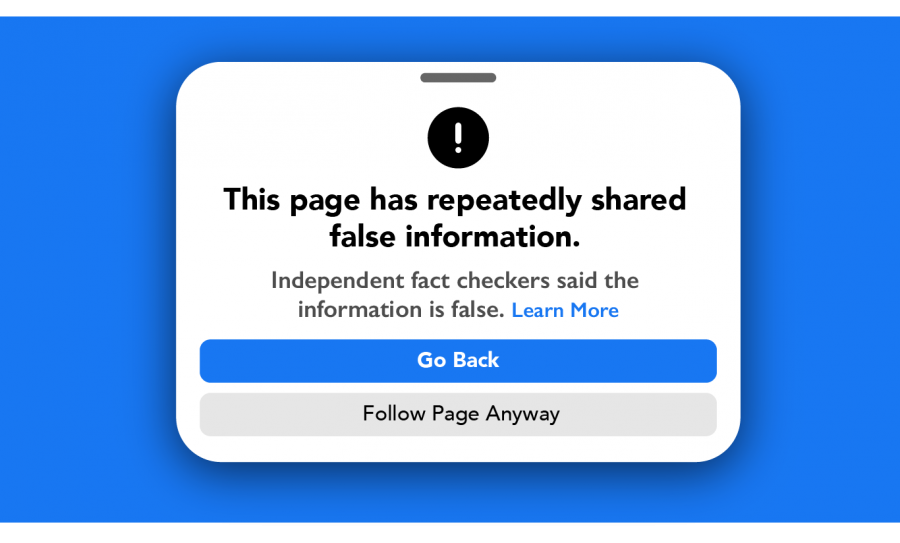Disinformation and the March Towards Extremism
Photo Illustration by Lukas Werner
Disinformation is being specifically weaponized and targeted against certain groups for political gain and it is destroying the fabric of our democracy.
November 17, 2021
The prevalence of misinformation (unintentionally misleading information) and the weaponization of disinformation (intentionally misleading information) has had drastic effects on the American political climate, as well as the very fabric of our republic.
The Capitol riot, for instance, was inspired by a conspiracy theory alleging that Democrats coordinated a comprehensive and widespread campaign to undermine the election and deprive former President Donald Trump of his rightful victory over the White House.
According to a Pew Research Center poll from January, only 7% of Trump voters say they definitely believe President Biden won the election, while 15% say he probably won.
Furthermore, QAnon has also taken root; a conspiracy theory alleging that a liberal syndicate of child molesters is controlling the planet.
And that these members also often kill and eat children in order to obtain adrenochrome, a chemical that is conspiratorially believed to extend the life of the user.
And that former President Donald Trump is the savior that will bring down this ring.
And, according to The New York Times, QAnon has the support of upwards of a dozen Republican House members.
It isn’t unreasonable to be baffled by these statistics. How could such radical beliefs become mainstream in the conservative political sphere, and, even more frighteningly, enter Congress? How does democracy survive with such a toxic and widespread issue distorting the foundational assumptions of democracy that America depends on?
We must recognize that a shared reality is one of the most central tenets of a functioning republic, and without it, we will inevitably find ourselves quickly falling into the dark trappings of authoritarianism.
While as individuals we are essentially powerless against a problem as widespread and prolific as disinformation, as an uncounted number of Americans helplessly fall victim to these claims, Congress can take bold action that could create real change; but first, we have to understand the root causes of the viral spread of conspiracies like the conspiracy around the election.
Arguably there are three main reasons behind this surge in far-right radicalization largely caused by disinformation: issues inherent to the conservative media ecosystem, the voter demographics of the Republican party, and an unwavering pursuit of profit by social media companies regardless of the effects of their products on democracy.
Firstly, it’s important to note the fundamental differences between the liberal and centrist media compared to the right-wing news ecosystem. While liberals gather around the institutionalized cable news sources like CNN, conservatives are far more likely to find themselves surrounded with significantly more partisan information, such as from Breitbart or Infowars.
Moreover, older Americans tend to be more conservative, and according to multiple studies are both more vulnerable and more in contact with disinformation. The facts suggest the prevalence of disinformation will worsen, likely to a dangerously high degree, as time goes on.
While 1 in 7 Americans are over 65 today, this number is expected to explode to 1 in 4 by 2060, and the susceptibility of the older generations may rise as well.
Although earlier cognitive decline than previous generations could be one cause of older individuals’ increasing vulnerability to fake news, partly as a result of increased mental health issues, lower likelihood of marriage, and decreased household wealth, there are less biological factors as well, ironically relating to how we currently deal with misinformation. For instance, platforms such as Facebook labeling certain posts as false usually increases the likelihood a user would take other non-flagged posts as fact.
But not all of these issues merely happened to become drivers of extremism. Some were calculated.
According to whistleblower Frances Haugen, a data engineer, Facebook has intentionally weaponized hate and conspiracy theories in order to increase their profits. Although free speech is also a cornerstone of a healthy democracy, social media has greatly exacerbated the ways in which people’s critical thinking faculties can be overridden by emotions completely separate from the facts.
Anger, for instance, can cause one’s beliefs to be more motivated by hyperpartisanship, while anxiety can increase the likelihood that someone would consider a belief or worldview they otherwise view with incredulity.
These psychological traps, albeit biological and possibly unchangeable on an individual level, are being used in ways that go beyond accident or coincidence. The Trump campaign, for instance, abused Facebook to spread false claims surrounding Joe Biden and his stance on ‘defunding’ the police, which he is staunchly against.
Facebook often shies away from warning their users about lies propagated by high profile politicians where they would otherwise step in, reinforcing not a strong stance against lies and hate, but a tentative and unprincipled attitude that refuses to meaningfully stand against power.
Various social pressures, like the aforementioned economic inequality that lead to the decline in mental health and cognitive ability of the elderly, or the social media that thrives off of the anger, anxiety, and hate ever-present in the modern day, all gather to boil in the increasingly influential cauldron of fascism.
Much like Germany after WWI in the 1930s, far-right nationalists in America do not act alone or in a vacuum. They’re the manifestation of a society that is ill with the anxieties of a declining economy, the politically weaponized fears stoked by Trump about a shrinking white majority, and the dismay over a push for far overdue equality.
Moreover, the fears of modern fascists, while unfounded to the same degree they were in the 20th century, can still manage to rot the once-respected foundation of American democracy. We see this time and time again.
Voting rights are under assault. Trump’s attempted coup, while unsuccessful, tested the conditional barriers against tyranny to their limits.
The history of the 20th century has shown how a small minority of extremists can have drastic effects that, if left unchecked, can rip through the presumed protections of a democratic constitution.
If former President Trump wins another term and his subservient Republican party wins Congress, the representative democracy that protects our freedoms will find itself plunged into peril — and by then it might be too late.
There were 77,000 members of the Nazi party at the beginning of 1931, and a short two years later, Adolf Hitler became chancellor.
This is not to say the fledgling republic in 1930s Germany could be directly compared to America. The United States has the longest existing constitution still in effect, and consequently, its resilience has been unmatched.
This said, democracy is not guaranteed, nor is it a system that can exist on its own without a strong effort of maintenance and preservation. Millions of citizens, including sitting Congress members who voted to overturn the election, identify themselves with Trump’s election fraud claims and even QAnon. The similarities between the far right of the 20th century and now are disturbing.
As eloquently revealed by writers like Umberto Eco, an Italian social author and commentator, fascism, though it takes many forms and can look entirely different from one culture to the next on a surface level, can often be defined by certain tenets that find their way into the fanatical right’s ideological framework with consistency.
The ‘obsession with the plot,’ for example, relating to the Nazi’s insistence that Marxist Jews controlled the world and were planning to destroy German culture, can seem similar to the narrative established by former President Trump.
For example, the previous President often referred to a conspiracy against him perpetrated by a ‘deep state’ controlled by ‘globalists’ plotting against him, and therefore America itself.
‘Disagreement is treason’ has become another common trope among fascistic thinking and Nazi rhetoric, and can be found littered in Trump’s words and actions. His speech around the election even led some of his supporters to claim Mike Pence, the former vice president to Donald Trump himself, of traitorous behavior.
It isn’t the time to pretend our government is invincible. It’s time for Congress to hold Facebook accountable and require alterations to an algorithm that spreads hate and misinformation like wildfire, and to force a fundamental change in how posts are evaluated by Facebook in determining what to recommend to their users.
Furthermore, as technology and social media become a fact of American life, we need to train young individuals in school how to determine when they’re being lied to and how to protect themselves from disinformation. Even though this won’t have immediate effects, raising a generation that is media literate will be essential in keeping democracy alive, and it’s something we can easily implement here at La Salle.
We can’t simply ignore the increasingly prevalent misinformation and disinformation that has corrupted our political system.
We have to fight it now; our democracy is worth protecting, and history shows us that waiting can only cause immeasurable suffering, whereas now Americans still have the opportunity to prevent the worst effects that are yet to come.






Noemi Skovierova • Nov 17, 2021 at 9:33 pm
Amazing article andrew! I think that it’s really important to talk about the ways that disinformation might present itself especially since social media makes it so easy to access and spread fake news. Awesome job!!